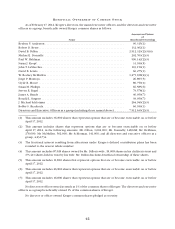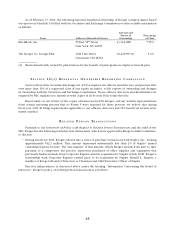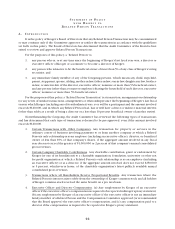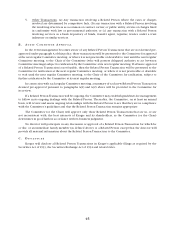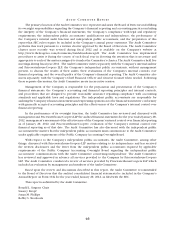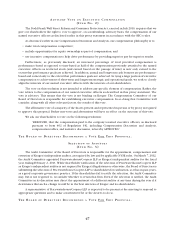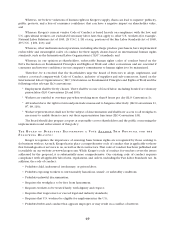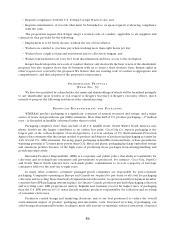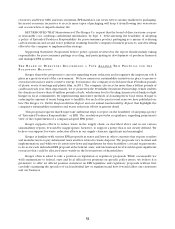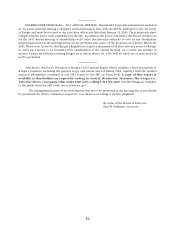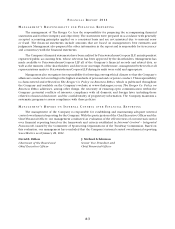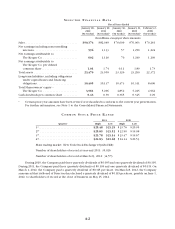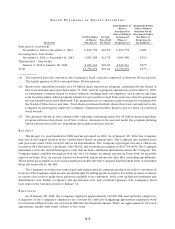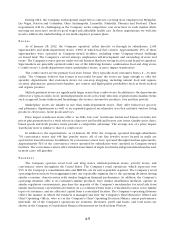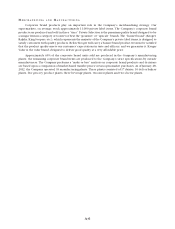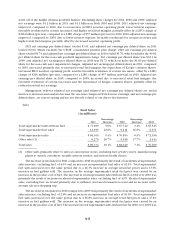Kroger 2011 Annual Report Download - page 53
Download and view the complete annual report
Please find page 53 of the 2011 Kroger annual report below. You can navigate through the pages in the report by either clicking on the pages listed below, or by using the keyword search tool below to find specific information within the annual report.
51
resources, and fewer GHG and toxic emissions. EPR mandates can create new economic markets for packaging.
Increased economic incentives to recycle more types of packaging will keep it from flowing into waterways
and oceans where it imperils marine life.
BE IT RESOLVED THAT Shareowners of The Kroger Co. request that the board of directors issue a report
at reasonable cost, omitting confidential information, by Sept. 1, 2012 assessing the feasibility of adopting
a policy of Extended Producer Responsibility for post-consumer product packaging as a means of reducing
carbon emissions and air and water pollution resulting from the company’s business practices, and describing
efforts by the company to implement this strategy.
Supporting Statement: Proponents believe policy options reviewed in the report should include taking
responsibility for post-consumer package recycling, and participating in development of producer financed
and managed EPR systems.
TH E BO A R D O F DI R E C T O R S RE C O M M E N D S A VO T E A G A I N S T TH I S PR O P O S A L F O R T H E
FO L L O W I N G RE A S O N S :
Kroger shares the proponent’s concerns regarding waste reduction and recognizes the important role it
plays as a good steward of the environment. We have numerous sustainability initiatives in place to preserve
our natural resources and to conserve energy. For instance, the company recycled more than 25 million pounds
of plastic waste, from bags and plastic film, in 2011. The company also recycles more than a billion pounds of
cardboard each year. Most importantly, we’ve pioneered the Perishable Donations Partnership, which enables
the donation of more than 40 million pounds of safe, wholesome food to Feeding America food banks to fight
hunger in local communities. By implementing innovative methods of donating these food items, Kroger is
reducing the amount of waste being sent to landfills. For each of the past several years we have published on-
line The Kroger Co. Public Responsibilities Report and our annual Sustainability Report that highlight the
company’s sustainability initiatives and waste reduction efforts in greater detail.
This proposal requests that Kroger take additional steps to report on the feasibility of adopting a policy
of “Extended Producer Responsibility,” or EPR. The resolution provides no guidance regarding proponent’s
view of the requirements of a company-adopted EPR policy.
Kroger supports efforts to reduce waste in the supply chain, as described above and in our various
sustainability reports. It would be inappropriate, however, to support a policy that is not clearly defined. We
believe our support for waste reduction efforts in our supply chain are significant and meaningful.
Kroger is familiar with various EPR proposals in states and laws in other countries that require retailers
and manufacturers to pay substantial taxes and fees related to waste disposal. The proposals vary in detail and
implementation, and while we do assess new laws and regulations for their feasibility, cost and requirements,
to do so for each individual EPR proposal at the federal, state, and international level would require significant
resources that could be allocated more wisely in the best interests of shareholders.
Kroger often is asked to take a position on legislation or regulatory proposals. While occasionally we
will communicate to federal, state and local officials our positions on specific policy issues, we believe it is
premature to offer an official position statement on EPR legislative and regulatory proposals without first
carefully examining the specifics of each individual law or regulation and how it would affect our customers
and our business.



